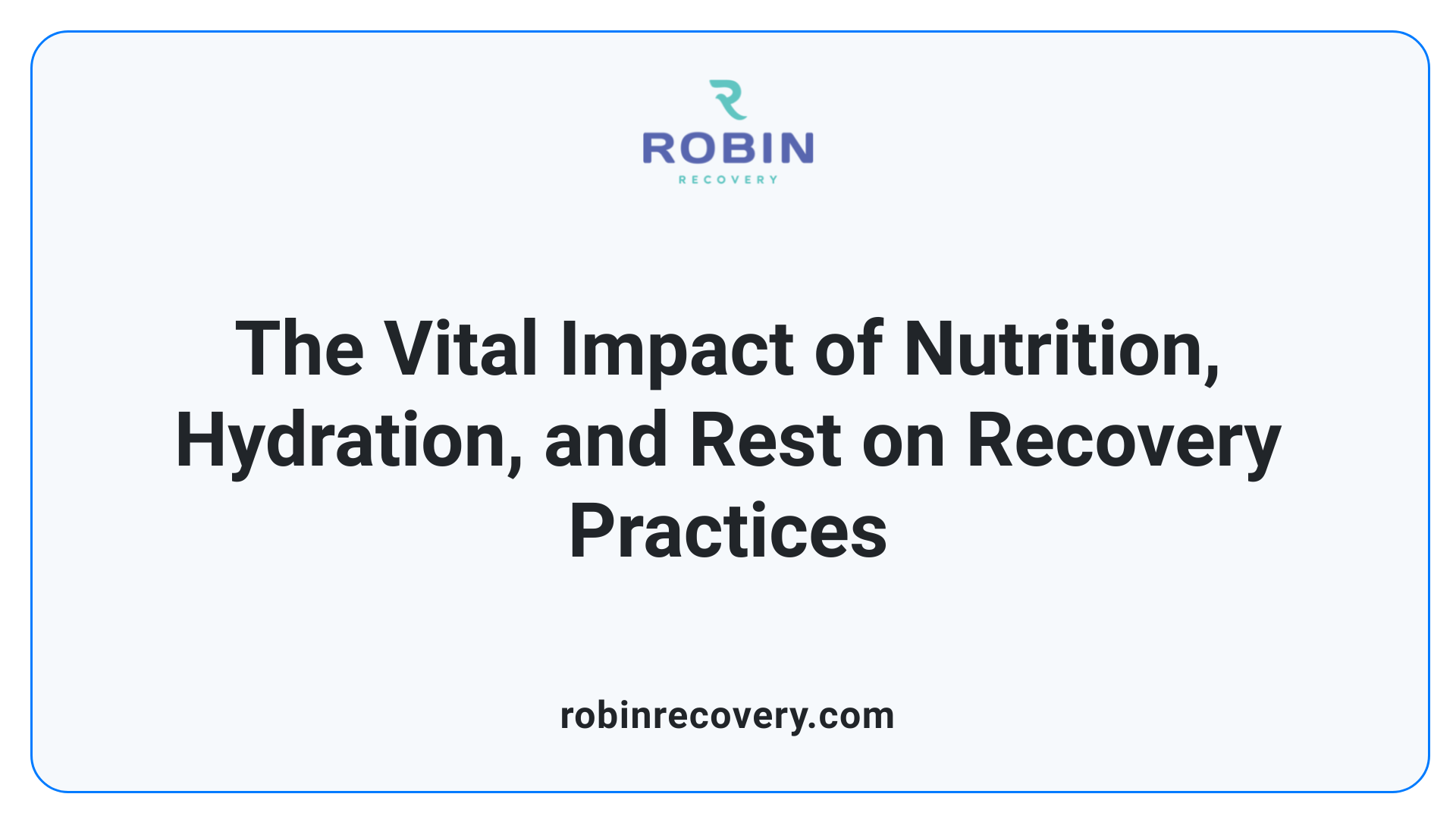Why Is A Recovery Routine Important – Part 2

Introduction
Recovery is often the unsung hero of athletic training, providing the foundation for improved performance and injury prevention. In this exploration, we delve deeper into why a well-structured recovery routine is paramount, offering insights into both the physiological and psychological benefits, effective strategies, and the consequences of neglecting this critical component of fitness.
The Role of Recovery in Athletic Success

Why is recovery important in athletic training and fitness?
Recovery plays a pivotal role in athletic training and fitness. It provides the necessary time for muscle healing and growth, which directly affects overall performance. After intense workouts, rest days are critical for repairing microtears in muscle fibers, allowing them to recover and grow stronger. This process not only replenishes glycogen stores but also helps alleviate accompanying muscle soreness and pain.
When athletes neglect rest, they increase their chances of suffering from overuse injuries and overtraining syndrome. Such conditions can severely impede progress, resulting in fatigue, reduced performance, and heightened injury risks. Sufficient recovery time is essential not just for physical health, but also for maintaining mental clarity and motivation.
Moreover, incorporating regular rest into a training regimen prevents burnout and encourages consistent decision-making in workouts. Routines that prioritize recovery enhance psychological resilience, allowing athletes to stay focused and driven. Structuring a training schedule that emphasizes rest will ultimately lead to sustainable fitness improvements, while also significantly lowering the risk of injuries.
Further Insights into Recovery Benefits
To highlight the multifaceted benefits of recovery and its impact, here are additional considerations:
AspectDescriptionBenefitsMuscle Healing & Growth Rest days allow muscle fibers to repair and grow stronger after microtears. Improved strength and hypertrophy. Injury Prevention Adequate rest minimizes the risk of injuries like strains and joint stress. Maintains proper form and technique. Mental Clarity Regular rest helps refresh the mind, preventing burnout and enhancing focus. Sustained motivation and effective training decisions.
Incorporating these insights into training regimens sets a solid foundation for high performance, providing athletes with the resilience needed to face challenges and excel in their pursuits.
Physiological and Psychological Benefits of Recovery Routines

What are the psychological and physiological benefits of a recovery routine?
A recovery routine offers numerous psychological and physiological benefits essential for athletes. Physiologically, it permits the body to repair and rebuild muscle tissue effectively, enhancing strength and replenishing energy stores after intense workouts. Proper recovery strategies, such as active recovery, keep the body engaged while mitigating the risk of injury and maintaining hormonal balance, which supports overall health. For instance, post-exercise practices like hydration and nutrition directly influence muscle recovery processes, ensuring optimal energy levels.
On the psychological front, a structured recovery routine aids in reducing fatigue and mood disturbances. Incorporating rituals such as mindfulness and proper sleep hygiene promotes better sleep quality, which is vital for emotional and cognitive function. With adequate rest and recovery, athletes can prevent mental burnout, maintaining motivation and focus, which contribute significantly to their long-term performance and resilience against stress.
In summary, creating and adhering to a comprehensive recovery plan is crucial not only for sustaining physical health but also for enhancing mental well-being and preventing overtraining, allowing athletes to thrive both in training and competition.
Exploring Recovery Strategies and Techniques

How can various recovery strategies and techniques be explained in detail?
Recovery strategies are pivotal for athletes aiming to enhance performance and prevent injuries. Several techniques stand out in promoting recovery:
- Active Recovery: This involves engaging in low-intensity exercises such as walking or cycling post-workout. The primary benefits include improved blood flow, which aids in lactate clearance, helping the body recover more efficiently and potentially enhancing performance compared to complete rest sessions.
- Hydrotherapy: Cold water immersion and contrast therapy (switching between hot and cold water) are forms of hydrotherapy that proponents claim reduce inflammation and muscle soreness. While these methods show promise, research results regarding their benefits for elite athletes are mixed, necessitating further investigation.
- Massage Therapy: Often used to relieve muscle tightness and soreness, massage therapy can enhance blood circulation. However, its overall effectiveness on performance enhancement remains inconclusive. Athletes report varied experiences from massages, indicating it may not always yield measurable performance benefits.
- Compression Garments: Worn during and after physical activity, these garments help enhance circulation and reduce muscle vibration during exercise, which may mitigate soreness and improve recovery time.
- Stretching: Incorporating stretching routines aids in maintaining flexibility and reducing muscle stiffness. Specific stretches targeting areas worked during exercise can be particularly effective.
By integrating a combination of these techniques, athletes can maximize recovery, improve performance outcomes, and reduce the risk of injury. Tracking their recovery routines through personal logs can assist in tailoring strategies to individual needs for optimal results.
Importance of Nutrition, Hydration, and Rest

How do nutrition, hydration, and rest impact effective recovery practices?
Proper nutrition, hydration, and rest are cornerstones of effective recovery practices for athletes. Nutrition provides essential macronutrients—such as carbohydrates, proteins, and fats—and micronutrients that are vital for muscle repair and energy replenishment after intense workouts. The timing of nutrient intake is also important; athletes should focus on a balanced intake of proteins and carbohydrates soon after exercising to maximize muscle recovery. For example, a snack like chocolate milk or a fruit smoothie can support optimal recovery by replenishing glycogen stores and promoting muscle synthesis.
Hydration's impact on physiological recovery
Hydration plays a critical role across numerous physiological processes that facilitate recovery. Adequate water intake helps maintain proper circulation, regulates body temperature, and assists in the elimination of metabolic wastes. It is recommended that athletes consume 16 to 24 ounces of water for every pound lost during physical activity to restore hydration levels effectively.
Role of sleep in muscle repair and overall health
Lastly, quality sleep is essential for recovery, influencing both physical and mental health. Adequate sleep—typically between 7-9 hours—supports hormonal balance and enhances muscle repair, cognitive function, and emotional regulation. Without sufficient rest, athletes may experience decreased performance, irritability, and impaired recovery, making sleep a vital component of any recovery strategy.
Topic Importance Recommended Practices Macronutrients Provide energy for workouts and muscle repair Balance proteins, carbohydrates, and fats in meals Hydration Supports circulation and waste elimination Drink adequate fluids post-exercise Sleep Enhances muscle recovery and hormonal balance Aim for 7-9 hours of quality sleep per night
Integrating Recovery into Workout Regimens
How should recovery be integrated into workout regimens?
Integrating recovery into workout regimens is essential for optimal performance and muscle repair. To achieve this balance, scheduling regular rest days is crucial, as they allow the body to recover from the stresses of training. Including active recovery methods such as light exercises or stretching can also be beneficial. Engaging in low-intensity activities for about 5 to 10 minutes post-workout helps to enhance blood flow and reduce muscle soreness.
What role does nutrition and hydration play in recovery?
Nutrition plays a crucial role in the recovery process. Consuming a mix of 20 to 40 grams of protein and carbohydrates within an hour after exercising helps replenish energy and supports muscle repair. This could be in the form of snacks like chocolate milk or smoothies. Moreover, adequate hydration is vital; athletes should aim for about 1.5 liters of water for every kilogram lost during exercise, helping to nourish muscles and eliminate toxins post-workout.
What therapies can aid recovery?
In addition to nutrition and hydration, various therapies can significantly aid recovery. Techniques like massage enhance blood circulation and relieve muscle tightness. Cold-water immersion can also promote recovery by reducing muscle soreness and inflammation, making it a popular technique among athletes. Ensuring sufficient sleep, ideally between 7 to 9 hours, is equally important, as it supports the body’s reparative processes.
Recovery Strategy Description Benefits Rest Days Scheduled days without intense workouts Allow for complete recovery, prevent overtraining Active Recovery Low-intensity exercises post-workout Improves blood flow, alleviates soreness, maintain routine Post-Exercise Nutrition 20-40 grams of protein and carbs ideally after workout Replenishes energy, aids muscle repair Hydration Drinking water post-exercise Ensures proper muscle function and toxin elimination Massage and Cold-Water Immersion Techniques to enhance blood flow and reduce tightness Promotes recovery, alleviates soreness
Consequences of Inadequate Recovery

What are the consequences of inadequate recovery and overtraining?
Inadequate recovery can trigger a cascade of adverse effects. One of the most significant concerns is overtraining syndrome, characterized by persistent fatigue, decreased athletic performance, irritability, and sleep disturbances. Athletes may find themselves feeling mentally and physically drained, struggling to meet their training goals.
Increased injury risk and decreased performance
Without sufficient recovery, the body cannot effectively repair the microtears caused during intense workouts. This failure leads to increased injury risk, including strains, sprains, and joint problems. Furthermore, performance can decline as athletes experience muscle soreness that doesn’t resolve, creating a vicious cycle of fatigue and underperformance.
Importance of proper rest in maintaining overall well-being
Proper rest is not just crucial for physical recovery; it also plays a vital role in enhancing mental health. Adequate sleep and structured recovery routines allow the body to replenish energy stores and maintain hormonal balance, which is critical for muscle repair and sport performance. This balance enhances cognitive function and emotional regulation, preventing burnout and keeping motivation levels high.
In summary, prioritizing structured recovery plans— which include getting enough sleep, incorporating rest days, and focusing on nutrition— is essential to mitigating the consequences of inadequate recovery in athletes.
Long-term Recovery and Periodization
Role of long-term recovery in performance
Long-term recovery plays an essential role in enhancing athletic performance. It provides the body with adequate time to repair and rebuild muscle tissue after the stress of training. This recovery phase is vital for adaptations that lead to improved strength, stamina, and overall fitness. Athletes often perform better when they allow for scheduled rest periods in their training regimens, ensuring that they can perform at their peak during competitions.
Importance of periodization in training schedules
Periodization refers to the systematic planning of athletic training, incorporating cycles of varying intensity and recovery. Structured training programs that include periods of recovery help athletes avoid the pitfalls of overtraining. By gradually adjusting training loads, athletes can optimize their performance while minimizing the risks associated with fatigue and injury.
Avoiding overuse injuries and burnout through structured rest
Implementing a well-designed recovery strategy includes regular rest days and lighter training phases. This approach reduces the risk of overuse injuries that can arise from repetitive strain on muscles and joints. Additionally, structured rest aids in preventing burnout, ensuring athletes remain mentally and physically engaged with their training.
Aspect Description Sample Practices Long-term recovery Essential for muscle repair and performance enhancement Scheduled rest weeks, active recovery rides Periodization Organized training cycles to optimize performance Varying intensities and training volume Avoiding injuries & burnout Structured rest minimizes injury risk and mental fatigue Implementing rest days, low-intensity workouts
Conclusion
A structured recovery routine is a linchpin for achieving long-term success in athletic endeavors. By understanding the significance of rest, nutrition, and varied recovery techniques, athletes can not only enhance their performance but also safeguard their health and well-being. Embracing recovery as a pivotal part of training ensures sustainable improvements, minimizes the risk of injury, and promotes overall mental and physical well-being. Remember, greatness in sports is not only built on exertion but equally on the foundation of recovery.
References
- Why Is A Recovery Routine Important – Part 2
- Injury prevention in-season and the importance of recovery: part 2
- Why rest and recovery is essential for athletes - UCHealth Today
- Prototype Performance and Recovery Series Part 2: The Importance ...
- Why Structure and Routine Are Important in Recovery
- Why active recovery is essential to any workout routine
- A Recovery Routine's Importance - TrueSport
- The Importance of Rest and Recovery | Concept2
